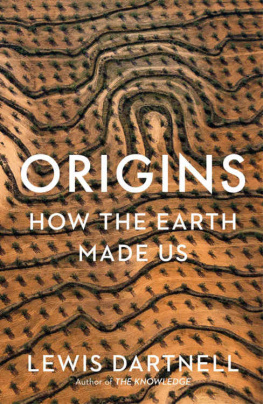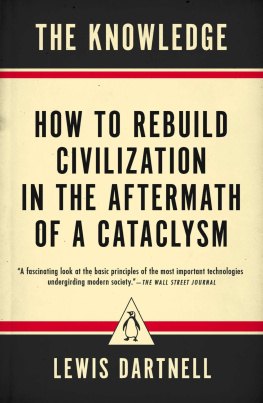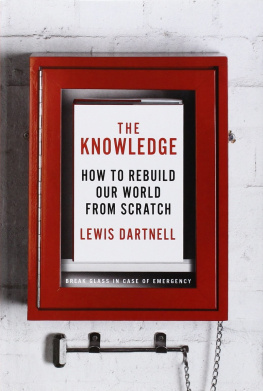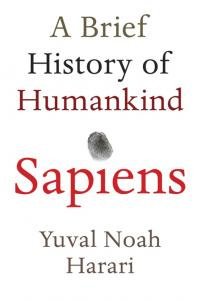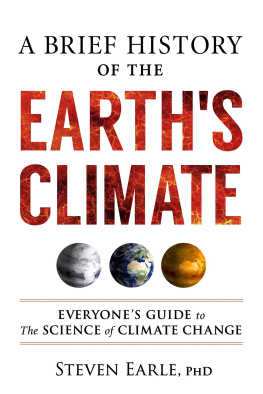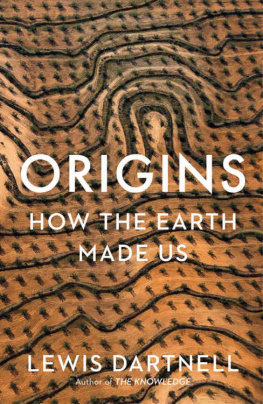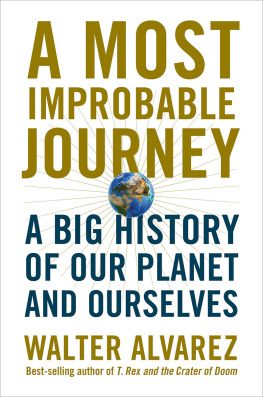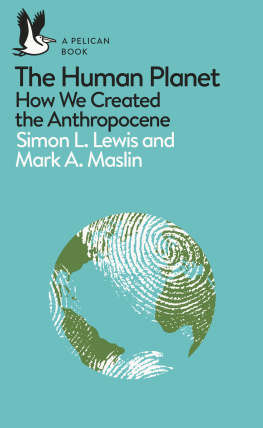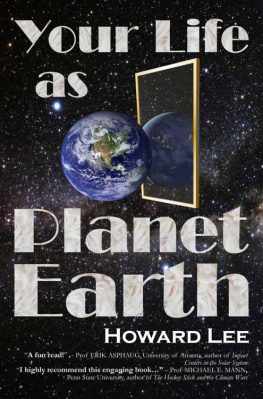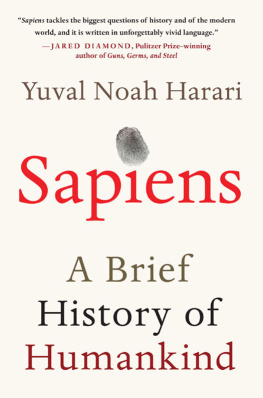Contents
Title Page
About the Author
Lewis Dartnell is an astrobiology researcher and professor at the University of Westminster. He has won several awards for his science writing, and contributes to the Guardian, The Times and New Scientist. He has also written for television and appeared on BBC Horizon, Sky News, and Wonders of the Universe, as well as National Geographic and History channels. A tireless populariser of science, his previous books include the bestselling The Knowledge: How to Rebuild Our World from Scratch.
ALSO BY LEWIS DARTNELL
Life in the Universe: A Beginners Guide
My Tourists Guide to the Solar System and Beyond
The Knowledge: How to Rebuild Our World from Scratch
Introduction
Why is the world the way it is?
I dont mean this in a musing philosophical way why are we all here? but in a deep scientific sense: what are the reasons behind the major features of the world, the physical landscape of continents and oceans, mountains and deserts? And how have the terrains and activities of our planet, and beyond that our cosmic environment, affected the emergence and development of our species and the history of our societies and civilisations? In what ways has Earth itself been a leading protagonist in shaping the human story a character with distinctive facial features, a variable mood, and prone to occasional fractious outbursts?
I want to explore how the Earth made us. Of course, each of us is literally made of the Earth, as is all life on the planet. The water in your body once flowed down the Nile, fell as monsoon rain onto India, and swirled around the Pacific. The carbon in the organic molecules of your cells was mined from the atmosphere by the plants that we eat. The salt in your sweat and tears, the calcium of your bones, and the iron in your blood all eroded out of the rocks of Earths crust; and the sulphur of the protein molecules in your hair and muscles was spewed out by volcanoes. The Earth has also provided us with the raw materials weve extracted, refined and assembled into our tools and technologies, from the roughly fashioned hand axes of the early Stone Age to todays computers and smartphones.
It was our planets active geological forces that drove our evolution in East Africa as a uniquely intelligent, communicative and resourceful kind of ape, while a fluctuating planetary climate enabled us to migrate around the world to become the most widely spread animal species on Earth. Other grand-scale planetary processes and events created the different landscapes and climate regions that have directed the emergence and development of civilisations throughout history. These planetary influences on the human story range from the seemingly trivial to the deeply profound. Well see how a sustained cooling and drying in Earths climate is the reason why most of us eat a slice of toast or a bowl of cereal for breakfast; how continental collision created the Mediterranean as a bubbling cauldron of diverse cultures; and how the contrasting climate bands within Eurasia fostered fundamentally contrasting ways of life that shaped the history of peoples across the continent for millennia.
We have become greatly concerned about humanitys impact on the natural environment. Over time our population has exploded, consuming ever more material resources and marshalling energy sources with greater and greater proficiency. Homo sapiens has now come to replace Nature as the dominant environmental force on Earth. Our building of cities and roads, damming of rivers, and industrial and mining activity are having a profound and lasting effect, remoulding the landscape, changing the global climate and causing widespread extinctions. Scientists have proposed that a new geological epoch should be named to recognise this dominance of our influence over natural processes on the planet the Anthropocene, the recent age of humanity. But as a species we are still inextricably linked to our planet, and the Earths history is imprinted in our make-up, just as much as our activities have left their distinct marks on the natural world. To truly understand our own story we must examine the biography of the Earth itself its landscape features and underlying fabric, atmospheric circulation and climate regions, plate tectonics and ancient episodes of climate change. In this book well explore what our environment has done to us.
In my previous book, The Knowledge, I set out to solve a thought experiment: how we might reboot civilisation from scratch as quickly as possible after some kind of hypothetical apocalypse. I used the notion of the loss of all that we take for granted in our everyday lives to explore how civilisation works behind the scenes. The book was essentially an investigation of the key scientific discoveries and technological innovations that enabled us to build the modern world. What I want to do this time is broaden the perspective, to discuss not just the human ingenuity that got us to where we are today, but to follow the threads of explanation back even further. The roots of our modern world stretch far back in time, and if we trace them deeper and deeper across the changing face of the Earth, we uncover lines of causation that often take us all the way back to the birth of our planet.
Anyone whos ever chatted with children will know what I mean here. For an inquisitive six-year-old asking about how something works or why something is the way it is, your immediate answer is never satisfactory. It opens up further mysteries. A simple initial question invariably leads to a whole series of why?, but why?, why is that? With an unquenchable curiosity, the child tries to get to grips with the underlying nature of the world it finds itself in. I want to explore our history in the same way, drilling downwards through more and more fundamental reasons and investigate how seemingly unrelated facets of the world in fact share a deep link.
History is chaotic, messy, random a few years of poor rainfall lead to famine and social unrest; a volcano erupts and annihilates nearby towns; a general makes a bad decision among the sweaty clamour and gore of the battlefield and an empire is destroyed. But beyond the particular contingencies of history, if you look at our world on a broad enough scale, both in terms of time and space, reliable trends and dependable constants can be discerned, and the ultimate causes behind them explained. Of course, our planets make-up has not preordained everything, but profound overarching themes can nonetheless be distinguished.
Our survey will reach over a staggering span of time. The entirety of human history has played out on an essentially static map within but a single frame of the Earths movie. But the world hasnt always looked like this, and although continents and oceans shift over geologically slow timescales the past faces of the Earth have greatly influenced our story. Well look at the changing nature of the Earth and the development of life on our planet over the past few billion years; the evolution of humans from our ape ancestors over the last five million years; the increase in human capabilities and dispersal around the world over the past hundred thousand years; the progression of civilisation over the last ten thousand years; the most recent trends of commercialisation, industrialisation and globalisation of the last millennium; and finally how we have come to understand this wondrous origin story over the last

